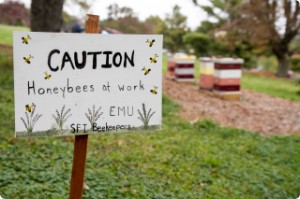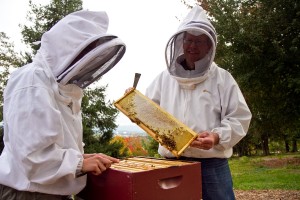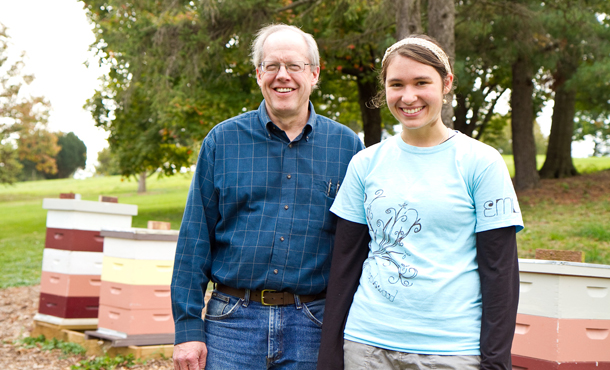Kenton Derstine, director of field education at Eastern Mennonite Seminary, is not just mentoring future pastors, he is also mentoring future beekeepers.
Contributing to the university’s efforts at sustainability, Derstine placed four bee hives on the grassy hill north of Eastern Mennonite University’s (EMU) seminary building. Derstine has been training an undergrad nursing student, Tessa Gerberich, in caring for the bees. In the spring, they expect to be joined by others interested in tending the hives and extracting the honey.
Derstine has been keeping bees since he was 15 years old. He now maintains 40 hives. His fascination with bees began in 10th grade when a teacher mentioned that you can buy anything from the Sears and Roebuck catalog, even bees. Derstine found the catalog and the bee equipment and has been hooked ever since.
“Bees help keep me in touch with the natural world,” said Derstine, who admits that he would otherwise spend most of his time with books and computers.
“My hives are in beautiful locations, so even going to visit them gets me out of my routine of office and home,” Derstine continued. “It keeps me in touch with the cycle of the seasons and attentive to the weather, much like farming would. I’m always paying attention to what is blooming.”
Caring for bees also makes Derstine more conscious of environmental issues. “Bees have been the canary in the coal mine for environmental issues. Part of my purpose in keeping bees is to be reminded of the responsibility I have to the environment and to pass that on to others.”
Derstine has had a number of opportunities to mentor beekeepers, both students and community members.
“I feel like this is a broader purpose for my beekeeping. I’ve never wanted to be a large producer, but I get great satisfaction out of assisting others as they learn.”

Beekeeping also provides a good metaphor for teaching seminary students to be good ministers.
“Beekeeping is good practice in managing your own reactive responses,” said Derstine. “If you can’t manage your own reactions with bees, they are able to sense it. If you move back too quickly, for example, they are attracted to that movement. Good ministry takes similar management of your own anxiety.”
He joked that perhaps next semester he would include a session with the bee hives in his mentored ministry and clinical pastoral education classes.
Derstine’s bee hives are just a few of the ways EMU is attempting to be more sustainable. The campus also features five vegetable and herb gardens that students, faculty and staff tend and harvest, as well as fruit trees and asparagus hedges and raspberry bushes.
